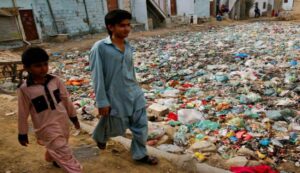Pakistan: Sahiwal hazardous solid waste disposal is endangering the ecosystem
Pakistan: On the banks of the Lower Bari Doab Canal (LBDC), close to the Jhal Road Overhead Bridge, the Sahiwal Metropolitan Corporation has been getting rid of the city’s solid trash for more than 20 years, Dawn said.

The Jhal Road location was selected at random for trash disposal without following any legal processes, and the city still lacks a designated dumping site even after becoming a metropolitan corporation in 2008. This results in the daily disposal of around 140 tons of solid trash on both banks of the LBDC, which spans 192 kanals on one side and 105 kanals on the other.
The Sahiwal Metropolitan Corporation’s Chief Sanitary Officer, Riaz, told Dawn that solid garbage has taken up around 10 million square feet of ground close to the Jhal Road Overhead Bridge. Despite the city getting a substantial boost of PKR 1.8 billion from an Asian Development Bank (ADB) initiative focused on enhancing municipal services, the matter is still unresolved.
The creation of a legitimate disposal facility is still a long way off, however. Although it hasn’t been carried out yet, Asjad Khan, City Manager for the Punjab Intermediate City Improvement and Investment Program (PICIIP), acknowledged that the ADB project includes a site acquisition for trash disposal.
There are now major health and environmental problems as a result of the daily rubbish disposal. Numerous health concerns, like respiratory disorders, skin conditions, and poor air quality, have been raised by locals in Muhammadpura, Hazoori Bagh, and Bhutto Nagar. According to Dawn, the situation is much more dangerous for nearby villages since the sporadic burning of solid waste exacerbates the already poisonous air.
Long-term garbage buildup draws pests like rats, flies, and mosquitoes, which may transmit illnesses like leptospirosis, dengue, and malaria, according to a public health officer who spoke on condition of anonymity. Public health is further endangered by the introduction of dangerous germs and diseases from decaying organic waste, which may pollute nearby canal water and soil. ADB authorities and environmental specialists have taken notice of the problem.
According to sources, the environmental and social divisions of the ADB expressed worries about the site’s effects on the environment, namely its contribution to poor air quality. “They conveyed to the commissioner/head of the divisional coordination committee that the existing site is creating environmental hazards and it is damaging the air quality index of the city,” according to Dawn.
Haji Mushtaq, a local, criticized the government for doing little to address the health hazards that the slum communities on Jhal Road presented to its people. “The district/divisional administration and the corporation show little interest in the health of poor citizens living in the slum areas of Jhal Road,” he stated, emphasizing the disregard for the welfare of residents.
Municipal official Waqas Akram admitted the problem, stating that the existing location is not suited for disposing of rubbish. According to Dawn, a recent joint inspection by representatives of the tax department, irrigation department, and municipal corporation revealed the scope of the issue.
The inspection report states that 6,562,500 cubic feet of garbage have been deposited on a section of land on the eastern side of the LBDC between RD 326 and RD 329, and an additional 3,562,500 cubic feet of rubbish have been deposited in a comparable section on the western side.
The company has located a new dump site close to Bunga Hayat, according to Sahiwal Commissioner Shoaib Iqbal. But he also admitted that local people’s lawsuits had caused delays in property purchase. “In the future, daily solid waste would not be disposed of near Jhal Road but at the new dumping site,” he said.





